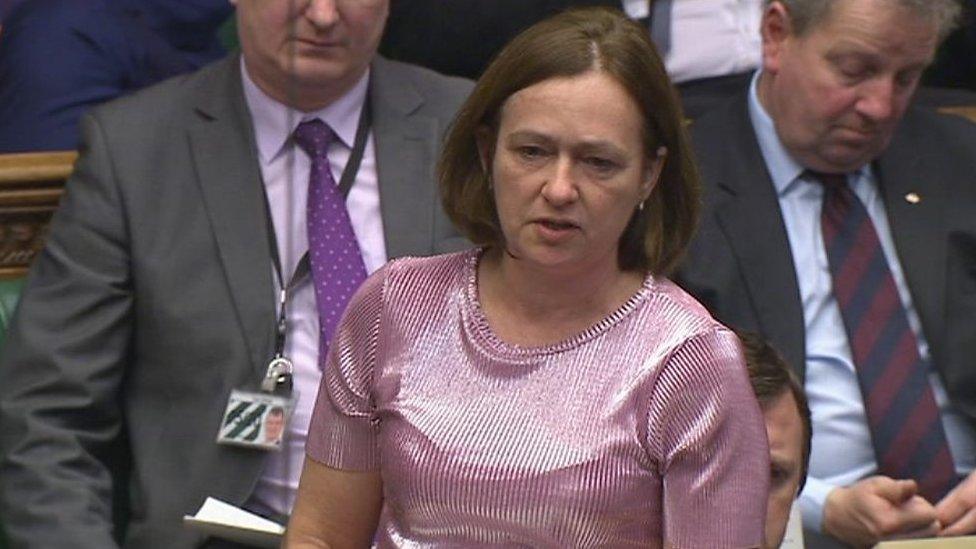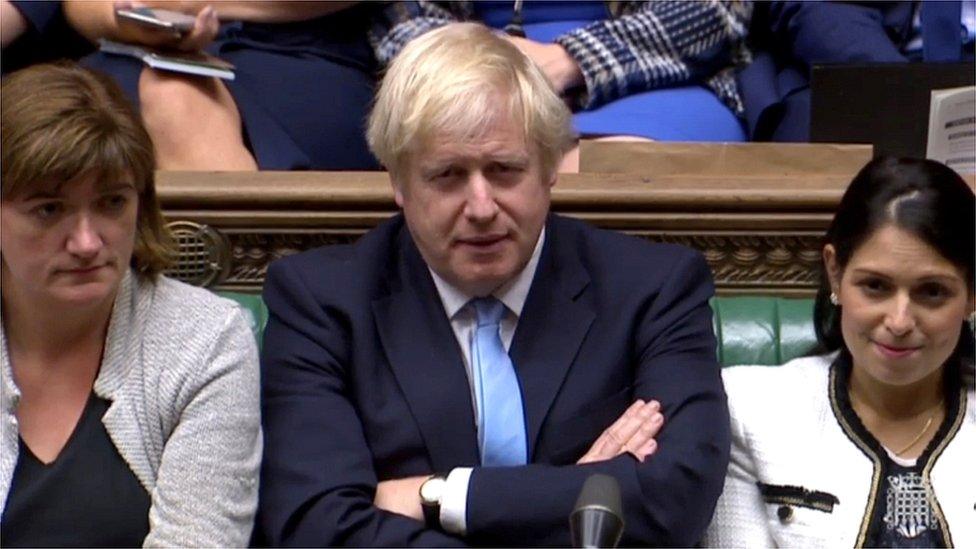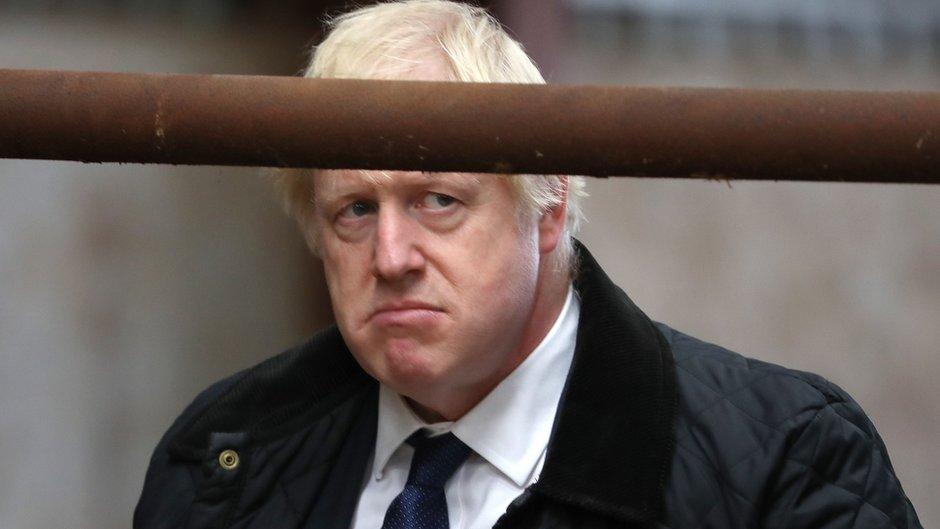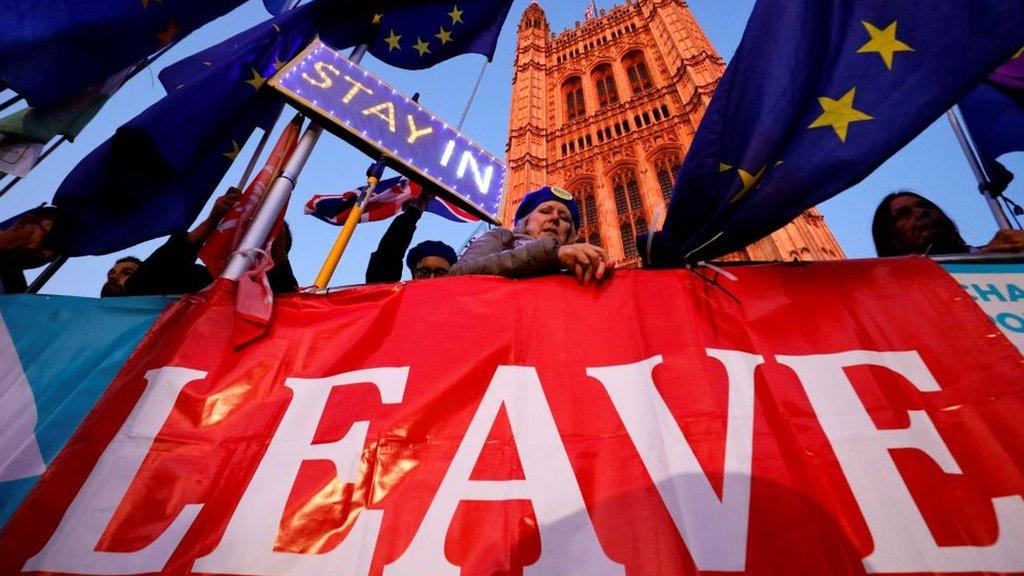Brexit extension: 'Impeach Boris Johnson if law ignored'
- Published
- comments
Breaking down a big week for Brexit
Opposition party leaders should be ready to try to impeach the prime minister if he ignores a new no-deal Brexit law, says Plaid Cymru.
Boris Johnson has "already driven a bulldozer through the constitution", said Plaid's Westminster leader, Liz Saville Roberts.
The law, which gained royal assent on Monday, aims to stop the UK exiting the EU with no deal on 31 October.
Number 10 has been contacted for comment.
No prime minister has ever successfully been impeached but Mr Johnson himself previously supported a bid to impeach, external Tony Blair when he was prime minister in 2004.
It is method by which Parliament can try individuals for high treason or other misdemeanours, but it is now considered to be obsolete, external.
The controversial five-week suspension of Parliament is to begin on Monday night, after opposition MPs including Plaid Cymru are again expected to reject government calls for a snap election.
The Brexit cross-party bill - which requires the prime minister to extend the exit deadline until January unless Parliament agrees a deal with the EU by 19 October - was passed on Friday.
But the prime minister has said he would "rather be dead in a ditch" than ask for a delay.

Liz Saville Roberts said politicians needed to "think the unthinkable"
Foreign Secretary Dominic Raab said previously that the government would abide by the law but would "look very carefully" at its "interpretation" of the legislation.
Legal experts have warned the prime minister could go to prison if he refuses to comply with the new law.
Ms Saville Roberts, MP for Dwyfor Meirionnydd, said opposition leaders had had a "productive" meeting on Monday where she urged her counterparts to consider impeaching Mr Johnson in such circumstances.
Sajid Javid: 'We are working wholeheartedly, straining every sinew, to get a deal'
She pointed out it was a procedure he had supported himself as a Tory backbencher in 2004 when current Plaid Cymru leader Adam Price sought to impeach the then Prime Minister Tony Blair over the Iraq war.
"I made absolutely clear that Plaid Cymru will leave no stone unturned in our attempts to stop Boris Johnson from inflicting the calamity of a crash-out Brexit upon the people of Wales," she said.
Ms Saville Roberts also stressed the need for opposition parties to be "united not only in opposition to no-deal, but also in favour of a positive alternative" in the form of a fresh referendum.
Meanwhile Conservative Monmouth MP David TC Davies said the likelihood of the UK leaving the EU on 31 October was "up in the air at the moment".
He told BBC Wales that by refusing to back a general election, opposition parties were "not willing to let the public have their say", claiming they feared people would vote for Brexit-supporting parties as they had done at the 2017 general election and the 2019 European parliament elections.
How does impeachment work?

Although a number of ministers up until the 19th Century have been impeached, no prime minister has ever successfully been impeached
It only takes one MP to make the accusation of high crimes and misdemeanours against a public official for the impeachment process to begin
The process would see the House of Commons first vote on an impeachment motion, which, if passed, could lead to prosecution and trial
Historically trials have taken place in Westminster Hall

Analysis by BBC Wales political editor Felicity Evans
No prime minister has ever been impeached, and while Boris Johnson would probably face legal action if he disobeyed the law, that action would most likely be in the courts rather than in Parliament.
But we are some way away from either of those situations arising at the moment.
Ministers insist that the PM will abide by the law, although Foreign Secretary Dominic Raab suggests he will "look very carefully" at the "interpretation" of the legislation.
Plaid has attempted impeachment against a prime minister before - Tony Blair over the Iraq War - it was a long shot then and remains so now.
The last (unsuccessful) attempt at the prosecution of an impeachment was in 1806.
Back in 1999 the Joint Committee on Parliamentary Privilege stated that "the procedure may be considered obsolete".
But politically, it is a means of keeping up the pressure on the prime minister and highlighting the serious nature of the dispute in question.
And with both government and opposition parties engaging in unconventional constitutional measures in the run up to 31 October, the improbable is not the impossible.
- Published10 September 2019

- Published8 September 2019

- Published7 September 2019

- Published25 October 2019
